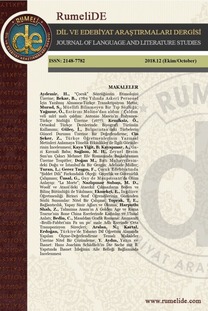Öncesi ve sonrası ile felsefe ve edebiyatta vicdani sistem
The system of conscience with its pre and post in philosophy and literature
The conscience system, reason, intuition, emotion, freedom, literature,
___
- Arendt, H. (1971). “Thinking and Moral Considerations”. Social Research, Vol. 38, No.3, 417-446.
- Berg, T. V. (2012). “What is Moral Conscience?”. Homiletic&Pastoral Review (ISSN 0018-4268). http://www.hprweb.com/2012/01/what-is-moral-conscience/
- Cengiz, Y.; Çınar, S. (Ed.). (2018). İslam Düşüncesinde Vicdan Kavramı. Ankara: Nobel.
- Cevizci, A. (2015). Felsefe Tarihi: Thales’ten Baudrillard’a. İstanbul: Say.
- Çelik, Ş. (2018). “Batı Felsefesi Tarihinde Genel Hatlarıyla Vicdan”. İslam Düşüncesinde Vicdan Kavramı (Ed. Yunus Cengiz ve Selime Çınar). Ankara: Nobel.
- Darwin, C. (1871). The Descent of Man, and Selection in Relation to Sex. Princeton: Princeton UP, 1981.
- Dostoyevsky, F. (1866). Suç ve Ceza. İstanbul: Cem Yayınevi, 1995.
- Erdoğdu, T. (2017). Özgürlükten Kurtulmak. İstanbul: Rumuz......................
- Fink, B. (1999). A Clinical Introduction to Lacanian Psychoanalysis-Theory and Technique. London: Harvard University Press.
- Foucault, M. (1975). Discipline and Punish: The Birth of the Prison (Trans. by Alan Sheridan). New York: Vintage Books, 1979.
- Foucault, M. (1980). Power and Knowledge: Selected Interviews and Other Writings 1972-1977 (Ed. by Colin Gordon). New York: Pantheon Books.
- Freud, S. (1926). Psikopatoloji (Çev. Hakan Atalay). İstanbul: Payel Yayınevi, 1999.
- Friedman, L. S. (2008). “Grief, Grief, Grief: Lord of the Flies”. William Golding’s Lord of the Flies (Edited by Harold Bloom). New York: Infobase Publishing, 59-70.
- Fuss, P. (1964). “Conscience”. Ethics, Vol. 74, No. 2, 111-120.
- Golding, W. (1954). Lord of the Flies. New York: Capricorn Books, 1959.
- Golding, W. (1955). The Inheritors. London: Faber and Faber.
- Hare, R. (1999). Without Conscience: The Disturbing World of the Psychopaths Among Us. New York&London: The Guilford Press.
- Kant, I. (1797). The Metaphysics of Morals. Cambridge: Cambridge UP, 1991.
- Kant, I. (1781). Critique of Pure Reason (Translated by Paul Guyer and Allen Wood). Cambridge: Cambridge UP, 1998.
- Kant, I. (1785). Groundwork of the Metaphysics of Morals (Trans. by Mary Gregor). Cambridge&New York: Cambridge UP, 2006.
- Lessing, D. (1974). The Memoirs of a Survivor. London: Picador, 1976..............
- Lessing, D. (1999). Mara ile Dann. İstanbul: Can Yayınları, 2011. .........................
- Myles, A. (1991). Doris Lessing: A Novelist with Organic Sensibility. New Delhi: Associated Publishing House.
- Nietzsche, F. (1887). On the Genealogy of Morals. (Trans. by Walter Kaufmann and R.J. Hollingdale). New York: Random House, 1967.
- Orwell, G. (1945). Animal Farm. Harmondsworth: Penguin Books, 2000.
- Orwell, G. (1949). 1984. London. Penguin Books, 1990.
- Pojman, L. P.; Fieser, J. (2012). Ethics: Discovering Right and Wrong. Boston: Wadsworth.
- Raphael, D. D. (2007). The Impartial Spectator: Adam Smith’s Moral Philosophy. Oxford: Oxford UP.
- Ratzinger, J. (2010). “Conscience and Truth”. Communio, Vol. 37, 529-538.
- Rousseau, J. J. (1921). Emile: Or on Education (Trans. by Barbara Foxley). New York: E. P. Dutton. Online Library of Liberty. http://oll.libertyfund.org/titles/rousseau-emile-or-education
- Shakespeare, W. (1603). Hamlet. Oxford: Oxford UP, 1995.
- Shakespeare, W. (1623). Macbeth. London: Penguin Books, 1990.
- Sorabji, R. (2014). Moral Conscience Through the Ages. Oxford: Oxford UP.
- Spohn, W C. (2000). “Conscience and Moral Development”. Theological Studies 61, 122-138.
- Strohm, P. (2011). Conscience: A Very Short Introduction. Oxford: Oxford UP. ........................
- Thomson, J. J. (1971). “A Defence of Abortion”. Applied Ethics (Ed. Peter Singer). Oxford: Oxford UP, 1986. Tüzün, M. (2011). Sevginin Son Kanıtı. Ankara: Arkadaş................................
- Yıldız, F. (2015). “Freud'da Ahlak Duygusunun Kaynağı ve Kant'ın Ahlak Düşüncesi”. FLSF (Felsefe ve Sosyal Bilimler Dergisi), Sayı: 19, 137-151.
- ISSN: 2148-7782
- Yayın Aralığı: 6
- Başlangıç: 2014
- Yayıncı: Yakup YILMAZ
Tarih bölümü öğrencilerinin bakışıyla göç: Bir metafor analizi çalışması
Mütercimi bilinmeyen eksik Kelile ve Dimne tercümesinin yeni varakları
Aleksandr Soljenitsın’ın İvan Denisoviç’in Bir Günü eserinde kişilik çatışması
Öfke ve umudun şehirde yankılanan sesi: Cahit Irgat şiiri
Bartın ili Ulus ilçesi Uluköy ve Zafer köyleri mikrotoponimleri ve dil incelemesi
Türkçede olumsuzluğa duyarlı ifadeler: Olumsuz uçluk mu olumsuz uyum mu?
Ömer Seyfettin’in eserlerinde kişi ve yer adları
N. G. Çernişevski’nin Nasıl Yapmalı? adlı romanında “yeni insan” tipleri
